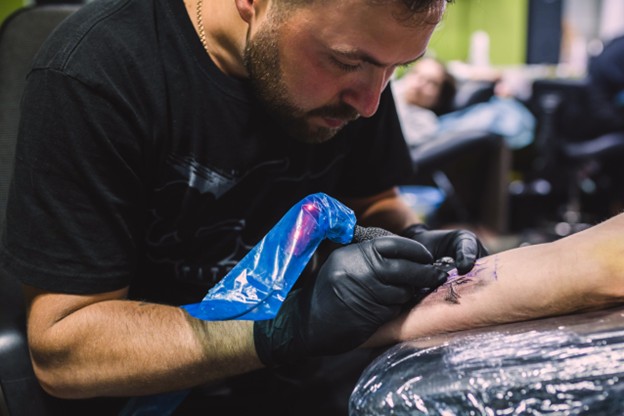Why Professional Tattoo Soap Is Essential for Cleaner Sessions and Better Results
Every artist understands the importance of hygiene and using a high-quality tattoo soap. This is one of the most important steps in maintaining a clean, safe, and efficient tattoo session. Tattooing involves repeated contact with ink, plasma, and equipment, and tattoo soap helps keep the skin clear so the artist can focus on precision. With the continued rise of detailed linework and long sessions, tattoo soap has become a key product that supports sanitation, comfort, and overall quality.
Tattoo soap is more than a basic cleanser. Its formulation is specifically designed to reduce irritation while keeping the skin consistently workable. When an artist relies on tattoo soap, they maintain a clean surface without compromising stencil clarity or causing unnecessary redness. As studios move toward stricter sanitation standards, tattoo soap has become a foundational supply that supports both client experience and studio reputation.
How Tattoo Soap Improves the Tattooing Process
The right tattoo soap can dramatically improve workflow. Unlike general cleaning solutions, tattoo soap is created specifically to address the needs of tattooing, where the skin must remain both clean and stable throughout the procedure.
Keeps Skin Clear and Ready for Every Pass
During a session, ink buildup can cloud visibility and increase wiping frequency. Tattoo soap helps break down ink without harmful ingredients, allowing the artist to see the lines clearly at every stage.
Protects Stencils During Long Sessions
Heavy soaps or multipurpose cleaners can cause stencils to fade early. Tattoo soap maintains surface clarity while respecting stencil adhesive, giving artists more working time and reducing the need for redraws.
Supports Better Client Comfort
Clients often feel more reassured when the artist uses tattoo soap that is formulated for sensitive skin. Instead of the dryness caused by generic soaps, tattoo soap keeps the area hydrated and reduces irritation.
Ingredients That Make Tattoo Soap Effective
Tattoo soap typically includes skin-friendly surfactants that lift ink, plasma, and residue without damaging the surface of the skin. Instead of harsh chemicals, most formulas include stabilizers and moisturizing agents that maintain balance even during long sessions.
Common beneficial ingredients include:
- Mild surfactants that break down ink
- Glycerin for hydration
- Aloe for soothing properties
- Plant-based cleaners that reduce irritation
These components help maintain the skin’s integrity while supporting the artist’s need for consistent visibility.
Using Tattoo Soap Throughout Each Stage of the Session
Tattoo soap is used before, during, and after the tattoo, each stage serving a different purpose within the studio workflow.
Pre-Session Preparation
Before stenciling application, artists use tattoo soap to remove oils and surface bacteria. This gives the stencil a clean, receptive base, helping it adhere correctly and prevent early smudging.
During the Tattoo
Throughout the process, tattoo soap keeps the canvas clean by lifting ink and plasma without increasing redness. A clear surface allows the artist to focus on detailed work, shading, and line consistency.
Post-Session Cleaning
Some artists include tattoo soap in the immediate aftercare wipe-down. Its gentle formula supports the first stage of healing, especially during the period when the tattoo is most vulnerable.
Tattoo Soap and Modern Studio Hygiene Standards
A studio’s reputation is built on its cleanliness, and tattoo soap helps artists meet the professional standards clients expect. The Alliance of Professional Tattooists publishes best-practice guidelines stressing the importance of using cleansers formulated specifically for tattoo procedures. Tattoo soap supports these recommendations by delivering controlled cleaning power while protecting the integrity of newly tattooed skin.
Studios that consistently use tattoo soap demonstrate attention to detail and commitment to safety. This not only protects clients but also helps artists maintain high- quality results in every appointment.
Why Tattoo Soap Increases Studio Efficiency
A smooth workflow is a priority for any busy studio. Tattoo soap helps reduce interruptions caused by excessive wiping, clogged pores, or blurred lines. When the skin remains clean and hydrated, the artist can focus on accuracy instead of managing buildup.
Clearer Visibility for Technical Work
Tattoo soap enhances visibility during linework and shading by ensuring the skin is never overwhelmed by excess ink. This helps the artist achieve more control with fewer mistakes.
Consistent Performance Across Artists
When every artist in a studio uses the same tattoo soap, clients benefit from uniform quality. It also helps new apprentices learn proper sanitation routines and reduces inconsistency between stations.
Reduced Stencil Failures
Stencil loss creates major setbacks in workflow. Tattoo soap helps prevent this by eliminating chemical interference and maintaining a skin-friendly surface.
How Tattoo Soap Supports Better Healing
While tattoo soap is primarily used during the session, it also contributes to the early stage of healing by minimizing unnecessary irritation. Many artists recommend tattoo soap for a client’s first few washes because it cleans the tattoo without stripping moisture or using fragrances that can disrupt recovery.
Better hygiene leads to fewer complications. Clients often report smoother healing when the initial cleaning is done with tattoo soap rather than generic household soap. This reinforces trust and encourages clients to return for future work.
Choosing the Best Tattoo Soap for Your Studio
The ideal tattoo soap is gentle, effective, and formulated for sensitive skin. Artists typically look for products with controlled foam, balanced pH, and a track record of safe performance on freshly tattooed skin. Since every session requires repeated wiping, tattoo soap must work reliably without causing dryness or irritation.
Investing in tattoo soap improves not only the tattooing experience but also the overall professionalism of the studio. When clients see the effort put into sanitation and comfort, they feel confident in the studio’s standards and more satisfied with the final result.





